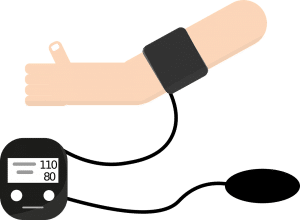If you were to head to the gym and start asking people why they’re there, working up a sweat on the treadmill, elliptical, or in a spin class, you’d probably hear a lot of the same answers. Of course, if you were to do that, you’d probably get a lot of funny looks and requests to leave people alone, so don’t actually do it. But in our imaginary scenario, most would probably say they’re doing cardio to lose weight or burn calories. This question is, though, are they (or anyone who’s doing mostly cardiovascular exercise in an effort to shed pounds) wasting their time and precious sweat?
The answer is a little complicated, because cardio is good for you, and it can be a healthy part of staying in shape – but it might not be the magical key to weight loss that we’re hoping it is. So hang onto your running shoes, and get ready to hear some truths about cardio and weight loss, because it turns out you might not be able to outrun what you’re eating.
The Benefits of Cardio
We’re certainly not trying to trash talk cardio. In fact, experts recommend that you get at least 150 minutes of moderate activity a week, or 75 minutes of vigorous activity. So as long as your body is up to it (and you start slowly with it if you’re not used to moving your body in an intense way), cardio can be really beneficial. As its name suggests, it’s great for your cardiovascular system, since it strengthens your heart and helps it more efficiently pump blood throughout the body.
But that’s not all. Cardiovascular exercise, like running, brisk walking, swimming, cycling, or even doing some serious gardening or housework (anything that gets your heart rate up and your large muscles working) can also help you to:

- Lower your blood pressure – Cardiovascular exercise can help lower blood pressure, and keep your arteries clear by raising “good” high-density lipoprotein (HDL) cholesterol and lowering “bad” low-density lipoprotein (LDL) cholesterol levels in the blood.
- Regulate your blood sugar – A study of people with type 2 diabetes published in the journal Sports Medicine found that regular physical activity helps regulate insulin levels and lower blood sugar, all while helping to keep your body weight in check.
- Get your zzz’s – In a study published in Sleep Medicine, participants who engaged in aerobic activity for 16 weeks reported better sleep quality and duration, as well as improvements in their daytime wakefulness and vitality.
- Reduce chronic pain – If you have chronic back pain, cardiovascular exercise, especially low-impact things like swimming or aqua aerobics, could help you get back muscle function and endurance.
- Strengthen your immune system – Researchers at Pennsylvania State University examined active and sedentary women and the impact of exercise on their immune systems. They found that the women who engaged in regular, moderate aerobic exercise had more antibodies called immunoglobulins in their blood, which can strengthen the immune system. The sedentary group of women saw no improvement in immune system function and their cortisol (the stress hormone) levels were much higher than those in the active groups.
- Fire up your brain – Did you know that the brain starts losing tissue after age 30? Well, a study in The Journals of Gerontology suggests that doing some cardio might be a way to slow down tissue loss and improve cognitive function. Researchers looked at magnetic resonance imaging (MRI) scans of older adults, and found that the adults who were most fit showed fewer reductions in the frontal, parietal, and temporal areas of the brain. You’re also less likely to develop Alzheimer’s and dementia if you work out regularly.
- Boost your mood – Feeling down? Even just a little bit of cardio can help. A study in the British Journal of Sports Medicine found that individuals with depression who did 30-minute sessions of walking on a treadmill reported a significant reduction in their symptoms of depression after just 10 days. And other experts say you don’t even need to wait 10 days – just one endorphin-boosting session of cardio can be enough to brighten your day.
- Maintain your weight
So no, we are definitely not telling you to give up on getting active. But we are questioning if doing cardio is enough to get you to your weight loss goals, or if you’re setting yourself up for discouragement and backsliding by relying on exercise to lose weight.
Does Exercise Equal Weight Loss?

We’ll start off by reiterating that you definitely should be as active as possible, and that exercise does play a part in maintaining a healthy weight. But – and it’s a big but – there might be some messages that we’ve heard for years that are, shall we say, unhelpful at best. For instance, exercise gurus, celebrities, food and beverage companies, gyms, sellers of fitness trackers and workout videos have long told us that getting in a good cardio sweat session means we can keep on indulging and still lose weight. How often have you heard someone say (or how often have you said it yourself) that they’re running to burn off those extra fries, or doing a spin class to have a few more margaritas at happy hour?
It turns out that there are a lot of things that are problematic about that way of thinking. It could be setting you up to give up, both on your weight loss goals, and your exercise routine, which has other health benefits besides helping you maintain your weight. In the last few decades, researchers and scientists have been questioning that old simplistic “calories in, calories out” model of weight loss and have been coming up with some very interesting theories on the real reason so many of us are struggling with our weight, even when we add cardiovascular exercise into the mix.
Let’s break those possible reasons down into two categories, and take a brief look at some of these more complex ways of looking at the relationship between exercise and weight loss.
The Limits of Exercise
There’s actually a lot we don’t know about how physical activity affects your body systems, but there is something we do know. While exercise is really good for your health in other ways, we can’t expect to lose a ton of weight from physical activity alone, because we simply can’t burn enough of the calories we eat through exercise to do so. It’s really more about what (and how much of it) you put into your body, in conjunction with how much you move your body.
Why is this? According to Alexxai Kravitz, a neuroscientist and obesity researcher at the National Institutes of Health, the way we burn energy is pretty set, especially our basal metabolic rate, or the energy used for basic functioning when our bodies are at rest, which is what uses up most of our energy. Our BMR accounts for around 60% of our energy expenditure, digesting food accounts for around 10%, leaving around 10-30% for physical activity.
That 10-30% is “not nothing, but it’s not nearly equal to food intake — which accounts for 100% of the energy intake of the body,” according to Kravitz. “This is why it’s not so surprising that exercise leads to [statistically] significant, but small, changes in weight.”
The National Institute of Health’s Kevin Hall gives a real world example of this: if a 200-pound man added 60 minutes of medium-intensity running four days a week, and kept his calorie intake the same, after 30 days, he’d lose five pounds. Probably not as much as you expected, right?
While a lot of people think you simply need to burn 3,500 extra calories and you’ll lose a pound, Hall’s modeling of how we burn calories and lose weight through exercise means that if you’re overweight or obese, it would take a whole lot of time, effort, and will power to shed a really significant amount of pounds through moving your body alone.
He points out that you can maintain weight very effectively through working out, but you might have trouble getting to that point if you put all of your weight loss eggs in one basket: “You need a huge volume of exercise to [burn enough calories for weight loss]. But to maintain weight loss does not require a deficit of energy.”
Our Bodies’ Reactions to Exercise
All of the above really drives home the point that, if we’re looking to lose weight, we really, really need to focus on what we’re eating and how much of it we’re consuming. But this might also be important not just because of the numbers game of energy in/energy out: some studies actually suggest that the ways our bodies react to food, and the way we eat, might change when we add more physical activity into our lives. For example:
- We might engage in “compensatory behaviors” – As Kevin Hall points out, when it comes to his 200-pound example man above, “I don’t think anybody believes calories in and calories out are independent of each other…If that person decided to increase food intake or relax more to recover from the added exercise, then even less weight would be lost.”

In other words, we might compensate for extra exercise in two ways: we might eat more, and we might rest more. For example, one 2009 study showed that people seemed to increase their food intake after exercise, either because they thought they burned off a lot of calories or because they were hungrier.
Another review of studies from 2012 found people generally overestimated how much energy exercise burned and ate more when they worked out. According to Hall, “You work hard on that machine for an hour, and that work can be erased with five minutes of eating afterward.” A single slice of pizza, sugary coffee drink, or bowl of ice cream, and you’ve pretty much replaced all of those calories burnt.
You might also just slow down after you do a hard workout: you might take more rests, move around in your daily life less (hello elevator instead of the stairs), or even stop fidgeting so much to make up for the energy you lost.
- Our bodies do something called “metabolic compensation” – According to Lara Dugas, an exercise physiologist at Loyola University, our bodies might actually be kind of, well, working against us when we start working out hard to lose weight: “The more you stress your body, we think there are changes physiologically — compensatory mechanisms that change given the level of exercise you’re pushing yourself at.” Unfortunately, studies seem to show that our basal metabolic rate can slow down to try and hang onto stored fat it might need for energy later on. Why body, why?
- The amount of energy our bodies are willing to burn might be “constrained” – While further research is needed on this, anthropologist Herman Pontzer has come up with the “constrained model” of energy expenditure, which would turn our idea that the more we work out, the more we burn on its head. Pontzer’ study suggests that after a certain amount of exercise, you don’t keep burning calories at the same rate. “The overarching idea,” Pontzer explained, “is that the body is trying to defend a particular energy expenditure level no matter how active you get.” In other words, it’s not just weight that plateaus, but the energy you burn, as well. Our bodies just don’t seem willing to go beyond that – thanks, body.
Don’t Give Up, But Make Changes
This all makes those spin classes, evenings spent running, or HIIT sessions in our living rooms seem pretty useless, and might make you feel a little bit hopeless about shedding those extra pounds – but don’t worry and don’t quit! We want to point out yet again that exercise is great for your health in other ways, and it can certainly help you keep the weight you lose off for good. But how do you get there in the first place if it’s not through grueling sweat sessions?
The answer to that is in your kitchen and on your plate, as well as in how much you move your body. In fact, an ongoing study by the National Weight Control Registry that looks at the traits, habits, and behaviors of adults who have lost at least 30 pounds and kept it off for a minimum of one year, has found that people who have had success losing weight have a few things in common. They weigh themselves at least once a week, restrict their calorie intake, stay away from (unhealthy) high-fat foods, watch their portion sizes, and exercise regularly.
While we don’t suggest getting obsessed with weighing yourself and restricting calories or types of food you allow yourself to eat, it does seem that what you eat – and how much of it you eat – matters. Really, what it seems to boil down to is eating well and healthfully in a way that you like and can sustain, as well as moving your body as a way to improve your overall health, without focusing on it as a way to punish your body and burn off that extra slice of pizza. Hey, we can certainly get on board with that.